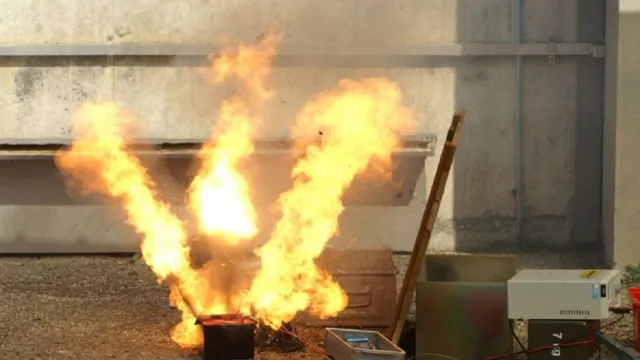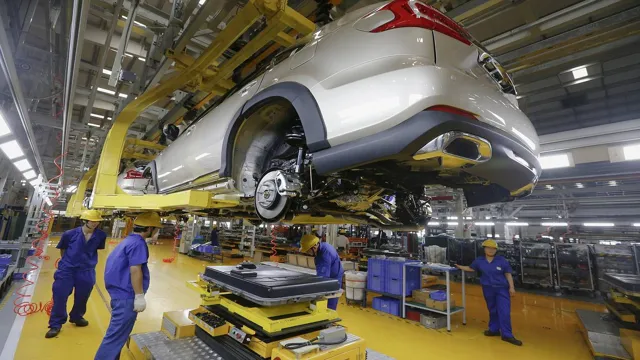No Cobalt, No Problem: The Rise of Cobalt-Free Electric Car Batteries
With the growing concern about climate change and the impact of fossil fuel consumption on the planet, many industries are switching to sustainable and eco-friendly solutions. Electric cars are a popular alternative to traditional combustion engines, but their batteries require metals like cobalt that are expensive and often sourced through unethical practices. However, many companies are now working on creating electric car batteries without cobalt.
These batteries are not only more sustainable but also cheaper to produce, making electric cars more accessible to the general public. But how exactly are these batteries made, and do they offer the same performance and durability as traditional ones? In this blog, we take a deep dive into the world of electric car batteries without cobalt, their manufacturing processes, and their potential impact on the automotive industry.
Why Cobalt-Free Batteries Matter
As electric cars become more mainstream, the demand for longer-lasting and more efficient batteries is on the rise. One solution to this problem is cobalt-free batteries. Cobalt is a mineral often used in the production of lithium-ion batteries, which are commonly used in electric vehicles.
However, cobalt is expensive and often sourced from countries with unethical mining practices. Additionally, cobalt can be toxic and dangerous for miners and the environment. By eliminating the need for cobalt, electric car batteries can become cheaper, safer, and more environmentally friendly.
Moreover, cobalt-free batteries can provide the same level of performance as those that contain cobalt, making them an excellent alternative for sustainable transportation. Overall, the development of electric car batteries without cobalt is a promising direction for the automotive industry.
Reduced Environmental Impact
As the world becomes increasingly reliant on electronic devices, the demand for batteries has skyrocketed in recent years. However, the production and disposal of these batteries have significant environmental impacts, particularly with the use of cobalt in their production. Cobalt, a rare and costly mineral, is often mined in developing countries under hazardous working conditions.
Additionally, cobalt waste can cause water pollution and harm to wildlife. The development of cobalt-free batteries is essential to reduce our environmental impact while still meeting the growing demand for batteries. By utilizing non-toxic materials such as sodium or magnesium, the manufacturing process becomes less hazardous, and the end-of-life disposal of batteries can be more sustainable.
Ultimately, transitioning to cobalt-free batteries is a necessary step towards a greener future.
Cost Savings
When it comes to batteries, cobalt has been the go-to material for a long time now. However, recent developments in technology have led to the creation of cobalt-free batteries that can provide many benefits. One of the biggest advantages of cobalt-free batteries is cost savings, as cobalt is a rare and expensive material that is often sourced unethically.
By utilizing cobalt-free batteries, companies can not only save money but also ensure that their operations are environmentally and socially responsible. Imagine having a car that doesn’t require frequent charging at gas stations and you don’t have to think twice about owning an electric scooter because of the high cost of the battery. This is what the industry is moving towards – creating batteries that are not only reliable but also ecologically friendly.
Cobalt-free batteries can reduce production costs, which results in savings for both the manufacturer and the end consumer. Furthermore, by limiting the use of cobalt in batteries, we can reduce our dependency on it, which can help stabilize prices and prevent human rights violations associated with its mining in countries like the Democratic Republic of Congo. In conclusion, cobalt-free batteries are an excellent example of how we can leverage technology to achieve sustainability goals.
By replacing cobalt in batteries, we can create a more ethical and cost-effective battery industry that benefits both consumers and manufacturers. As demand for electric vehicles and other battery-powered devices continues to grow, the adoption of cobalt-free batteries becomes all the more critical not just for economic savings but also for environmental and social responsibility.
Improved Safety
The improved safety of cobalt-free batteries is a significant concern in the battery industry. Cobalt is known to be a highly toxic and carcinogenic material that poses a great risk to human health and the environment. Therefore, the move towards cobalt-free batteries is a crucial step in enhancing the safety of batteries used in various industries.
Without cobalt, these batteries become less volatile and reduce the risks of potential fires and explosions, making them much safer to use in consumer electronics and electric vehicles. Moreover, cobalt-free batteries are also eco-friendly, reducing the negative impact on the environment by reducing hazardous materials used in battery production. It’s important that we continue to explore new, safer materials to create sustainable batteries that can guarantee the safety and health of end-users and the planet.
Cobalt-Free Battery Materials
Electric car batteries without cobalt have been the subject of much research and development in recent years. Cobalt, a metal often used in batteries, has a high cost and poses ethical concerns regarding its mining practices. Several alternatives to cobalt, such as nickel and manganese, have been explored to create more sustainable and affordable electric car batteries.
Additionally, research has focused on developing new materials, such as lithium-iron-phosphate and sodium-ion, that promise to reduce or eliminate the use of cobalt altogether. While these new materials may not yet match the performance and reliability of traditional cobalt-containing batteries, they offer a more environmentally friendly and ethical option that could prove crucial for the future of electric vehicles.
Lithium Nickel Manganese Cobalt Oxide
If you’ve been keeping up with battery technology, then you may have heard of the latest breakthrough in lithium-ion batteries – lithium nickel manganese cobalt oxide (LiNiMnCoO2), or NMC. While current batteries use cobalt as one of their main components, NMC batteries are cobalt-free, making it a cheaper and more sustainable alternative. NMC batteries have a high energy density, making them ideal for use in electric vehicles, as well as consumer electronics.
Plus, the material has a longer lifespan compared to other lithium-ion batteries, meaning you’ll get more use out of your products before having to replace them. As more companies shift towards sustainable manufacturing, NMC batteries could prove to be a significant player in the future of battery technology.
Lithium Iron Phosphate
Cobalt-Free Battery Materials If you’re someone who’s passionate about clean energy and alternative power sources, you’ve probably heard of lithium iron phosphate (LFP) batteries. LFP batteries are among the most promising cobalt-free battery materials, which makes them an excellent alternative to traditional lithium-ion batteries. What’s great about LFP batteries is the fact that they are much more environmentally-friendly than their counterparts.
They are capable of delivering a lot of power while still being long-lasting, which is why they’re used in a wide range of applications. Whether you’re talking about electric cars, solar panels, or even power tools, LFP batteries can offer the kind of power and efficiency that is required to make green energy a reality. Compared to traditional batteries, chemical composition makes them less prone to overheating, which is another valuable advantage.
Overall, LFP batteries have the potential to revolutionize green energy and help us build a more sustainable future while reducing our dependence on harmful fossil fuels.
Nickel Manganese Cobalt Oxide
As people become more environmentally conscious, there has been a growing interest in developing cobalt-free battery materials. One such material that has been gaining attention is nickel manganese cobalt oxide (NMC), which has the potential to replace cobalt in lithium-ion batteries. NMC has several advantages over cobalt, including lower cost, higher safety, and better energy density.
This material is also more sustainable, as it reduces the reliance on cobalt, which is often mined under questionable labor practices. With the increasing demand for electric vehicles and energy storage solutions, the use of NMC in battery manufacturing may become more widespread in the future. While there are still some challenges to be overcome, such as improving the stability and lifespan of NMC batteries, the potential benefits make this material an exciting prospect for the future of battery technology.
Advantages of Cobalt-Free Battery Materials
Electric car batteries without cobalt are gaining traction due to many benefits of cobalt-free materials. Cobalt is a mineral mostly sourced from unstable regions with poor human rights records, and its procurement can have severe environmental impacts. Using cobalt-free batteries can help end the reliance on unethical sources, making electric vehicles more sustainable in the long run.
Additionally, cobalt-free materials often result in lighter batteries, which translates into longer driving ranges and improved energy efficiency. The absence of cobalt also extends the life of batteries, reducing the need for frequent replacements. By using alternate materials, manufacturers can create better performing batteries that make electric vehicles more affordable, durable, and sustainable.
All in all, cobalt-free battery technology is a significant step towards environmentally responsible and sustainable driving in the future.
Higher Energy Density
One of the major advantages of using cobalt-free battery materials is that they have a higher energy density. This means that they can store more energy per unit of mass than traditional batteries that use cobalt. The higher energy density allows these batteries to last longer, which is particularly important in applications like electric vehicles where range is a critical factor.
Additionally, cobalt-free materials are often safer and less expensive than cobalt-based materials, making them an attractive option for manufacturers. While cobalt has been a popular choice in the past due to its stability and performance, the growing demand for sustainable and environmentally friendly alternatives has led to a shift towards cobalt-free materials. As technology continues to improve, we are likely to see even more efficient and cost-effective cobalt-free batteries in the future.
Longer Lifespan
As technology advances, researchers are constantly looking for ways to improve battery technology. One of the most significant advancements in recent years has been the development of cobalt-free battery materials. Cobalt is a commonly used material in batteries, but it has many drawbacks, including being expensive, unsustainable, and potentially hazardous.
Cobalt-free batteries, on the other hand, have a longer lifespan, making them more environmentally friendly and cost-effective in the long run. The use of alternative materials, such as manganese, nickel, and iron, make these batteries safer and more sustainable, reducing the environmental impact associated with battery production. Another benefit of cobalt-free batteries is that they are less prone to overheating, reducing the risk of explosions and other safety hazards.
As a result, cobalt-free battery materials have become increasingly popular in the technology industry, as they offer many advantages over traditional batteries, making them a more attractive option for consumers and businesses alike.
Future of Cobalt-Free Batteries
Cobalt is a metal that is used in most battery packs, but its mining has some environmental and ethical concerns. As the world moves towards cleaner energy alternatives, manufacturers are seeking ways to produce electric car batteries without cobalt. Fortunately, there have been great strides in technology that will make this possible.
For instance, researchers have developed a type of cathode that is cobalt-free, and it has been incorporated into batteries produced by Tesla and BMW. Similarly, others are testing the use of nickel-manganese-cobalt (NMC) or nickel-cobalt-aluminum (NCA) chemistries, which contain much less cobalt. While the issue of durability and longevity remains a challenge, progress has been made to make cobalt-free batteries more viable for mass adoption.
Undoubtedly, the future of electric car batteries without cobalt looks promising, and we can expect to see more manufacturers switch to this technology over time.
Conclusion
In the race towards sustainable transportation, one element has been holding us back: cobalt. Used extensively in electric car batteries, cobalt has been linked to human rights abuses in mining communities and environmental degradation. But fear not, for a new generation of batteries is emerging, free from cobalt! With advancements in technology and design, we may soon have the power to drive towards a cleaner, greener future without leaving a harmful trail behind.
So get ready to charge up and hit the road, knowing that your electric car is not only better for the planet, but also for the people who call it home.”
FAQs
Why are electric car batteries without cobalt important?
Electric car batteries without cobalt are important because cobalt is a scarce and expensive mineral, and its mining has ethical and environmental concerns. Electric car manufacturers are looking for alternatives to cobalt to reduce their dependence on it.
What are the alternatives to cobalt for electric car batteries?
Alternatives to cobalt for electric car batteries include nickel, manganese, and aluminum. Nickel-based batteries are currently the most common alternative, but they have their own challenges, such as instability and fire risk.
How do electric car batteries without cobalt affect the performance of the vehicle?
Electric car batteries without cobalt can have similar or better performance than cobalt-based batteries, depending on the materials used. For example, some nickel-based batteries have higher energy density than cobalt-based batteries, which results in longer driving range.
Are electric car batteries without cobalt available on the market?
Yes, some electric car manufacturers are already using or testing electric car batteries without cobalt. For example, Tesla announced in 2020 that it had developed a cobalt-free battery for its Model S and Model X vehicles and plans to use it in other models as well. Other manufacturers, such as General Motors and BMW, are also exploring cobalt-free battery options.




